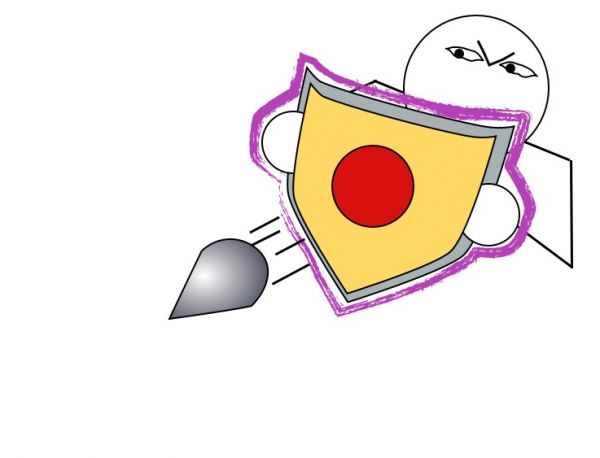
The recent Daily Trojan article on sarcasm left me a little out of sorts. “One idiom calls sarcasm the lowest form of wit,” the columnist wrote. Though it’s not a direct attack, I still feel that it’s my duty to hold up some sort of shield to protect sarcasm and USC Basement, where sarcasm brings us our daily meat. So, this article’s my shield, and since another idiom tells me that the best defense is a good offense, I’m going to make that a magical +5 shield of spike-throwing.
My first spiky point of attack is that, after pinning the reputation for sarcasm on students in the title, the DT columnist ends her first paragraph with this:
“It’s just that sarcasm is everywhere.”
That’s extremely true. Super true! Soooooo true! Just like those three little snippet sentences weren’t sarcastic. Sarcasm is everywhere because it’s a staple of humor. Lots of people (over)use it, and at least one of them has a Captain America shield hanging on the set of his show on Comedy Central.
Which brings us to my next spiky point: I don’t think sarcasm’s all that bad.
You know how I said sarcasm brought home Campus Basement’s “daily meat”? After your gutter-minded laugh about one possible interpretation of that phrase, you might have thought I was getting my idioms wrong (oh, idioms…).
But I wasn’t.
The DT columnist concludes (for those of you who still haven’t followed the ever-loving link) with a food analogy:
“If each brand of humor were a spice, sarcasm would be salt: It makes almost anything a little tastier, but too much of it can ruin a dish that would’ve been fine on its own.“
I agree. With everything the writer says. I think it’s an effective comparison. Congratulations.
No, seriously. I’m not being sarcastic. It’s a good piece of writing, and I tip my hat to it.
You thought I was going to tear it to pieces, didn’t you? Instead of ripping it up, I’m going to extend it, because I think that it doesn’t go far enough back in time.
The world didn’t have widespread refrigeration until the mid-19th century and even the early 20th century. If you wanted to keep meat (or anything else perishable) from spoiling, you had to chill it with ice you harvested over the winter…
OR dry it out with salt.
Sure, it made the meat crusty and murdered your arteries, but the salt kept it edible. And humor’s the same way.
Speaking only for myself, I haven’t yet learned to be consistently cool in my humor writing. This means that I tend to spoil the topics, leaving what little meat there is to the jokes out in the summer of the public eye where the bacteria and flies get at it. If I add enough sarcasm to my article, however, it guarantees an audience who enjoys salty humor and offsets how fast the jokes go bad. Maybe I’ll learn to do better some day, to keep my jokes cool, but until then my refrain at the article table is “pass the sarcasm, please.”
Does that really work, you ask? For my third spiky point, I would like to draw your attention to something the DT columnist noticed: USC Spectrum just hosted some writers from The Onion, which derives much of its humor (and even some of its equations) from sarcasm. They’ve done pretty good business for almost 25 years now. Now, see, in that last sentence, the part before the “for’? That was sarcasm. Their site has 7.5 million different readers a month, and may Jimmy Wales strike me dead if I’m lying (Is it sarcasm if he actually does it? His eyes creep me out, man).
And, once more with feeling, Stephen Colbert has a Captain America shield.
If you intentionally avoid sarcastic humor, you create a mini-chasm in the salt. Those of us who don’t put limits on how ludicrously sarcastic we can be, for some to the point of being nasty, can cross over that gap at will and use comic material without sarcasm, then gleefully leap back over. Limit yourself, and you won’t be able to. After all, it’s not your chasm. It’s sarcasm.

































